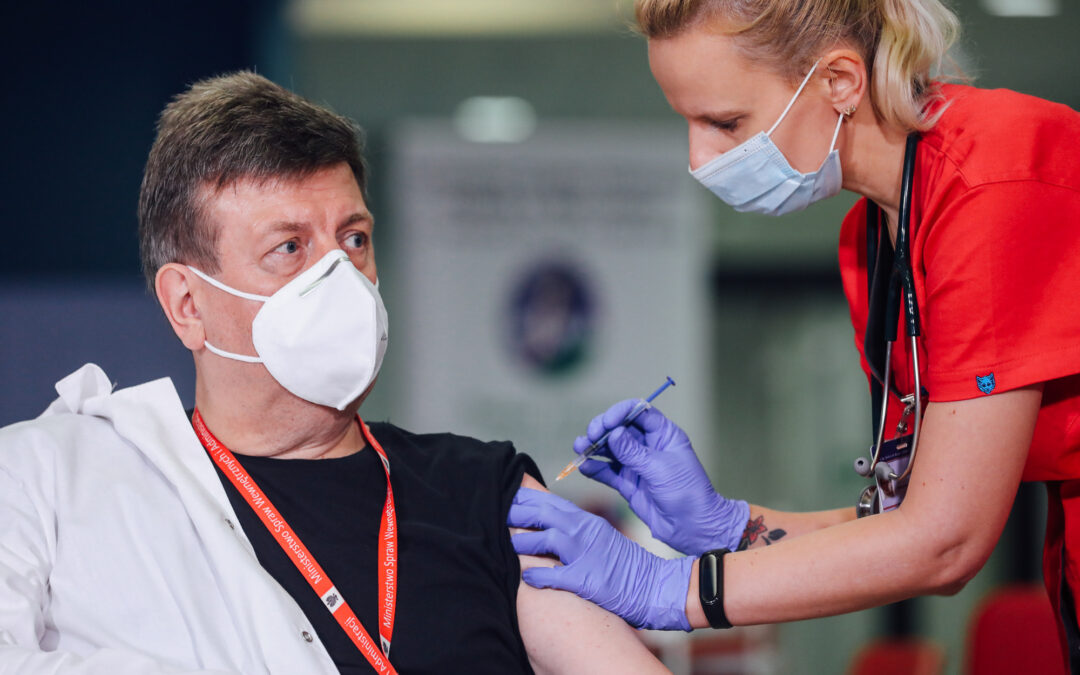The Polish government has announced details of the timetable for its rollout of coronavirus vaccines, as it ends its initial focus on medical staff and “enters the mass vaccination stage”.
It has confirmed that a central patient registration system will be launched on 15 January. Initially, the jabs will be available to people aged 80 and above, followed later in the month by the over-70s and then teachers and members of the uniformed services.
The government has also pledged to double the number of vaccines administered in the country by the end of this week, when it expects the figure to reach 450,000.
Yesterday was the most productive day since the vaccine rollout began, with more than 45,000 people receiving jabs, bringing the overall total to 258,000. The government aims to have vaccinated 3 million people (almost 8% of the population) by the end of March.
More than a million Pfizer COVID-19 vaccine doses have already arrived in Poland, while the first shipment of Moderna vaccines is expected today, informs the Polish Press Agency (PAP).
During the current stage of the rollout, around one million people in the so-called “zero group” are eligible for vaccinations. They are comprised mainly of staff at medical facilities and care homes.
Subsequently, during Stage I, the elderly as well as members of the uniformed services and teachers will be eligible for vaccination. They are able to begin registration from 15 January.
From that same date, vaccinations of the over-80s will begin to be arranged. From 18 January, the vaccination of care home residents starts. Finally, from 22 January those aged above 70 can begin arranging vaccinations, with the first taking place on 25 January.
No start dates for the vaccination of teachers and the uniformed services has yet been announced.
📋 Rejestracja pacjentów na szczepienie przeciw COVID-19 ⤵#SzczepimySię pic.twitter.com/LlKbxkTClY
— Kancelaria Premiera (@PremierRP) January 11, 2021
Stage II will cover vaccinations for the over 60s with underlying health conditions and who are considered clinically vulnerable (contrary to the government’s previous plans for all over-60s to be included).
It will also apply to people working in “critical infrastructure”, including water, gas and electricity delivery, telecommunications, the postal service, public transport, the judiciary, customs and tax offices, and professions responsible for fighting the pandemic and providing safety of food and medicine delivery.
During Stage III, registration and vaccination will be open to everyone else. No timeframe for this has yet been announced.
Registration will be available online, in person and by telephone. The government has also promised to help ensure transport for the vulnerable and those with mobility challenges.
Meanwhile, there has been a large increase in the proportion of Poles willing to vaccinate against coronavirus, according to polling by United Surveys for Dziennik Gazeta Prawna and RMF FM. In November, only 42.6% wanted to vaccinate; now the figure is 67.6% – a 25 percentage point increase.
“We are pleased to see the increased interest in the vaccine,” said Michał Dworczyk, the government official overseeing the vaccine rollout, quoted by Dziennik Gazeta Prawna.
“Media coverage of the celebrities and politicians jumping the queue could have convinced some people that the vaccine is a desirable, rare commodity, which means it’s worth getting the jab,” he added.
Main image credit: Adam Guz/KPRM/Flickr (under public domain)

Agnieszka Wądołowska is deputy editor-in-chief of Notes from Poland. She is a member of the European Press Prize’s preparatory committee. She was 2022 Fellow at the Entrepreneurial Journalism Creators Program at City University of New York. In 2024, she graduated from the Advanced Leadership Programme for Top Talents at the Center for Leadership. She has previously contributed to Gazeta Wyborcza, Wysokie Obcasy and Duży Format.




















